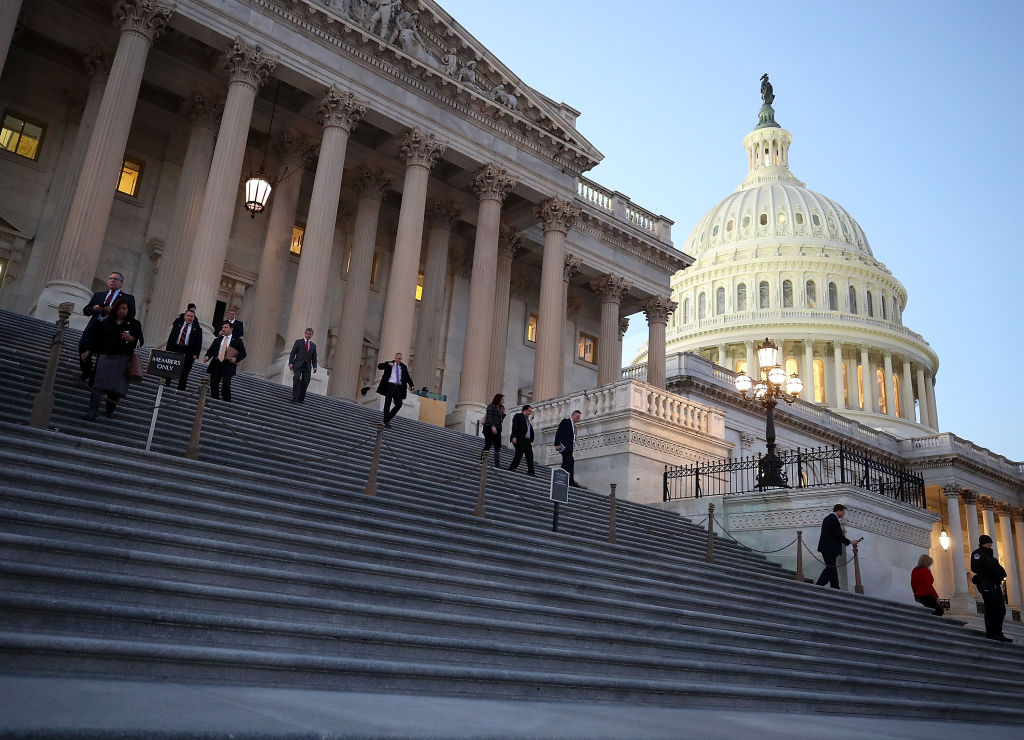The U.S. government will now run out of cash in early March, thanks to the GOP tax law, the CBO says


A free daily email with the biggest news stories of the day – and the best features from TheWeek.com
You are now subscribed
Your newsletter sign-up was successful
Congress will have to the raise the debt ceiling in the first half of March, weeks earlier than forecast, or the federal government will run out of cash, the Congressional Budget Office said Wednesday. The CBO attributed the shortened deadline to the tax overhaul Republicans passed in late 2017, which will lower tax receipts by $10 billion to $15 billion a month starting in February. In all, the U.S. will take in $136 billion less tax revenue in 2018 under the new tax law, the nonpartisan congressional Joint Committee on Taxation estimates.
The Treasury Department has been taking emergency measures to keep the U.S. solvent since the debt limit was suspended Dec. 8, but if Congress doesn't raise the federal borrowing limit in early March, "the government would be unable to pay its obligations fully, and it would delay making payments for its activities, default on its debt obligations, or both," the CBO warned. The federal government ran a $23 billion deficit in December and a $666 billion deficit for all of 2017, the biggest shortfall since 2013.
Congress hates raising the debt ceiling but has never failed to do so, brinkmanship notwithstanding. Lawmakers also have to pass a spending bill by Feb. 8 to keep the government open, and deal with the immigration status of DREAMers before President Trump's March deadline. It's possible all these items will be rolled up into a big, must-pass package, The Washington Post notes, though House conservatives would balk "and it's unclear what political coalition will form this time to help raise the borrowing limit."
The Week
Escape your echo chamber. Get the facts behind the news, plus analysis from multiple perspectives.

Sign up for The Week's Free Newsletters
From our morning news briefing to a weekly Good News Newsletter, get the best of The Week delivered directly to your inbox.
From our morning news briefing to a weekly Good News Newsletter, get the best of The Week delivered directly to your inbox.
A free daily email with the biggest news stories of the day – and the best features from TheWeek.com
Peter has worked as a news and culture writer and editor at The Week since the site's launch in 2008. He covers politics, world affairs, religion and cultural currents. His journalism career began as a copy editor at a financial newswire and has included editorial positions at The New York Times Magazine, Facts on File, and Oregon State University.
-
 ‘Restaurateurs have become millionaires’
‘Restaurateurs have become millionaires’Instant Opinion Opinion, comment and editorials of the day
-
 Earth is rapidly approaching a ‘hothouse’ trajectory of warming
Earth is rapidly approaching a ‘hothouse’ trajectory of warmingThe explainer It may become impossible to fix
-
 Health insurance: Premiums soar as ACA subsidies end
Health insurance: Premiums soar as ACA subsidies endFeature 1.4 million people have dropped coverage
-
 TikTok secures deal to remain in US
TikTok secures deal to remain in USSpeed Read ByteDance will form a US version of the popular video-sharing platform
-
 Unemployment rate ticks up amid fall job losses
Unemployment rate ticks up amid fall job lossesSpeed Read Data released by the Commerce Department indicates ‘one of the weakest American labor markets in years’
-
 US mints final penny after 232-year run
US mints final penny after 232-year runSpeed Read Production of the one-cent coin has ended
-
 Warner Bros. explores sale amid Paramount bids
Warner Bros. explores sale amid Paramount bidsSpeed Read The media giant, home to HBO and DC Studios, has received interest from multiple buying parties
-
 Gold tops $4K per ounce, signaling financial unease
Gold tops $4K per ounce, signaling financial uneaseSpeed Read Investors are worried about President Donald Trump’s trade war
-
 Electronic Arts to go private in record $55B deal
Electronic Arts to go private in record $55B dealspeed read The video game giant is behind ‘The Sims’ and ‘Madden NFL’
-
 New York court tosses Trump's $500M fraud fine
New York court tosses Trump's $500M fraud fineSpeed Read A divided appeals court threw out a hefty penalty against President Trump for fraudulently inflating his wealth
-
 Trump said to seek government stake in Intel
Trump said to seek government stake in IntelSpeed Read The president and Intel CEO Lip-Bu Tan reportedly discussed the proposal at a recent meeting
